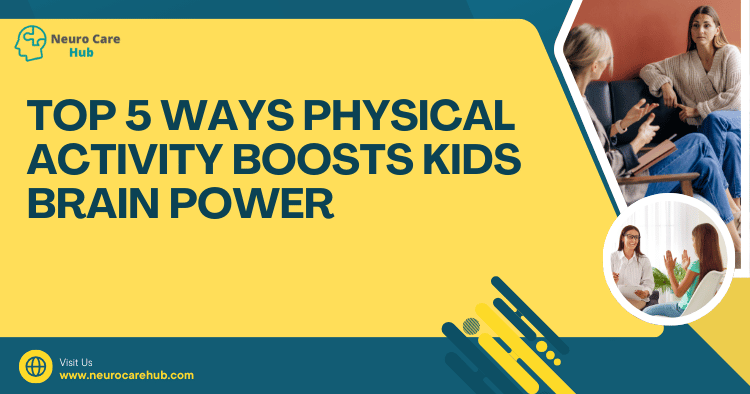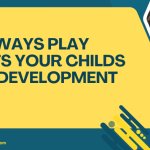Table of Contents
- Introduction
- Enhances Memory and Learning
- Boosts Concentration and Attention
- Reduces Anxiety and Stress
- Fosters Social Skills and Teamwork
- Promotes Better Sleep
- Conclusion
- FAQs
Introduction
In today’s fast-paced world, it’s easy to overlook the connection between physical activity and cognitive skills, especially when it comes to children. However, research has shown that engaging in regular physical activity can significantly enhance brain power in kids. From improved memory to better concentration, the benefits are numerous and profound. Let’s dive into the top five ways physical activity boosts kids’ brain power!
1. Enhances Memory and Learning
Physical activity has a direct impact on brain function, particularly in areas related to memory and learning. When kids engage in exercise, their hearts pump faster, increasing blood flow to the brain. This rise in blood circulation helps deliver more oxygen and nutrients, which are crucial for brain health.
- Neurogenesis: Exercise encourages the growth of new brain cells, particularly in the hippocampus, which is vital for learning and memory.
- Long-Term Benefits: A study by the University of California, Los Angeles, found that children who participated in regular physical activity scored higher on memory tests compared to their sedentary peers.
For more insights on cognitive functions and how physical activity promotes brain health, check out our article on Top 5 Essential Insights on Neuro Care You Need to Know.
2. Boosts Concentration and Attention
One of the most immediate benefits of physical activity is its ability to enhance concentration and attention spans. When kids exercise, their bodies release endorphins, which not only elevate mood but also sharpen focus.
- Increased Dopamine Levels: Physical activity boosts dopamine production, a neurotransmitter linked to focus and motivation.
- Better Academic Performance: According to a study published in the Journal of School Health, students who engage in physical activity exhibit better grades and improved behavior in class.
Tips for Parents:
Encourage your child to participate in activities they enjoy, whether it’s soccer, dance, or swimming. The more they enjoy the activity, the more likely they are to stick with it.
3. Reduces Anxiety and Stress
Regular exercise is a natural way to combat stress and anxiety in children. Physical activity stimulates the production of serotonin, which can lead to improved mood and emotional regulation.
- Stress Relief: Kids who engage in physical activities are less likely to experience feelings of anxiety and depression.
- Mindfulness and Relaxation: Activities such as yoga and tai chi not only promote physical health but also enhance mental well-being through mindfulness practices.
For more insights on how physical activity influences mental health, visit our article on Neuro Care vs. Mental Health Care: Key Differences Explained.
4. Fosters Social Skills and Teamwork
Participating in team sports or group activities allows children to develop essential social skills. Physical activity teaches kids how to work cooperatively, communicate effectively, and build friendships.
- Team Dynamics: Engaging in sports fosters a sense of belonging and teamwork, which are crucial for emotional and social development.
- Conflict Resolution: Kids learn to navigate conflicts and challenges in a supportive environment, which can translate to better interpersonal skills in other areas of life.
Fun Fact:
According to the American Academy of Pediatrics, children who participate in team sports are more likely to have higher self-esteem and social skills.
5. Promotes Better Sleep
A good night’s sleep is vital for cognitive function, and physical activity can play a significant role in improving sleep quality. Kids who are physically active tend to fall asleep faster and enjoy deeper, more restorative sleep.
– Circadian Rhythm: Regular exercise helps regulate the body’s internal clock, leading to improved sleep patterns.
– Restorative Sleep: Quality sleep enhances memory consolidation and cognitive function, allowing kids to perform better academically.
For tips on establishing a sleep routine, check out The Sleep Foundation.
Conclusion
Incorporating physical activity into your child’s daily routine is one of the best gifts you can give them. Not only does it promote physical health, but it also enhances cognitive skills that will serve them well throughout their lives. Encourage your kids to explore different activities and find what they love, creating a lifelong habit that fuels their brain power!
FAQs
Q: How much physical activity do kids need?
A: The Centers for Disease Control and Prevention (CDC) recommends that children ages 6 to 17 get at least 60 minutes of moderate to vigorous physical activity each day.
Q: What types of physical activities are best for kids?
A: Activities that get kids moving and are fun! This includes sports, dancing, swimming, biking, and even active play like tag.
Q: Can physical activity help with learning disabilities?
A: Yes! Some studies suggest that regular physical activity can help improve focus and learning in children with learning disabilities.
Q: How can I encourage my child to be more active?
A: Be a role model! Participate in activities with your child, limit screen time, and provide opportunities for them to explore different sports or physical activities.
By promoting a physically active lifestyle, you’re not just helping your child grow stronger; you’re also empowering their minds to reach new heights! For further reading on enhancing brain health, check out our resource on Top 5 Lifestyle Changes for Better Neuro Health.






